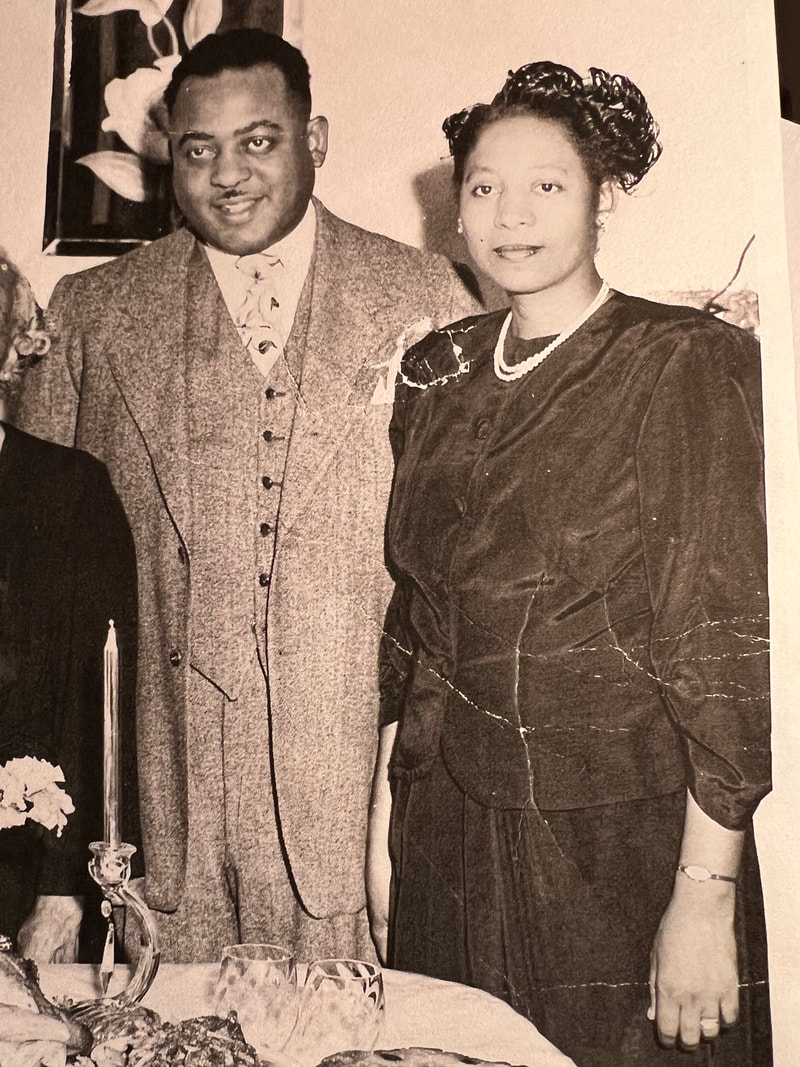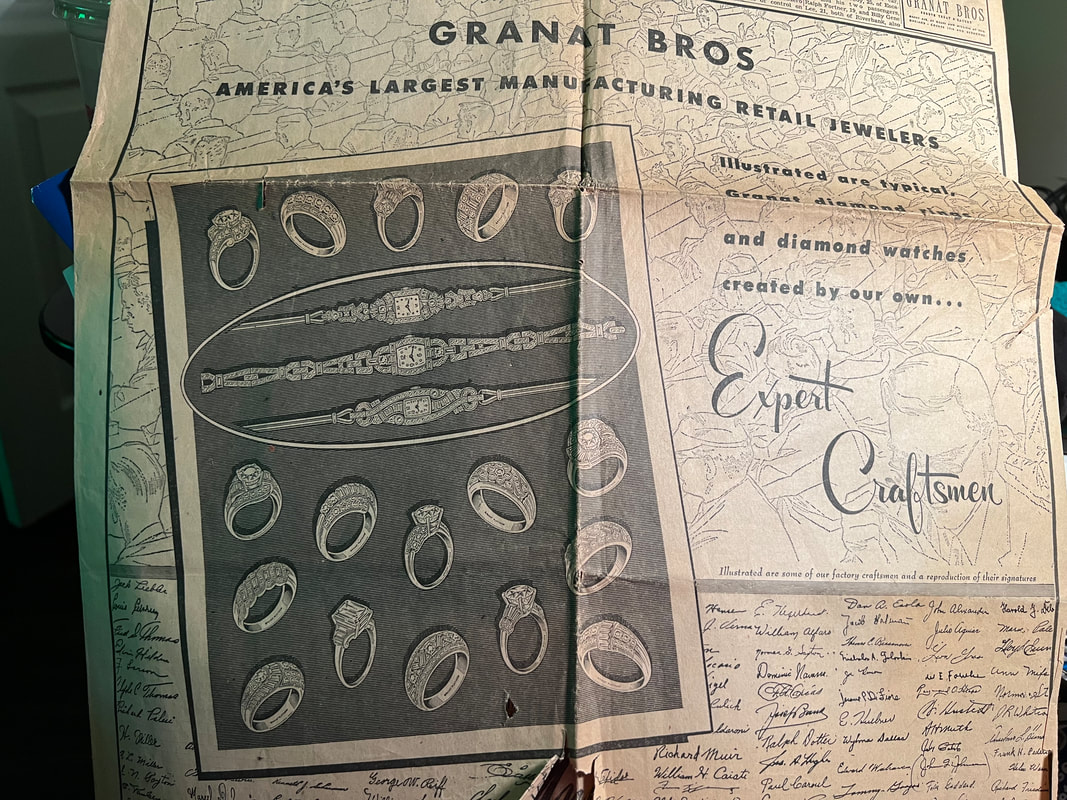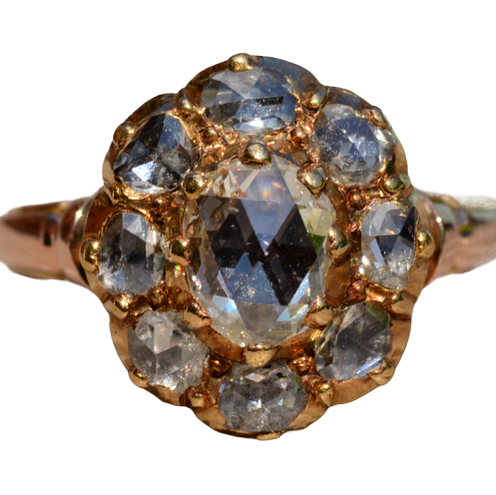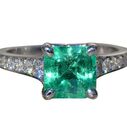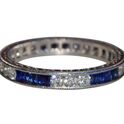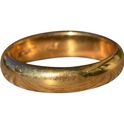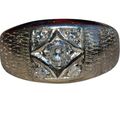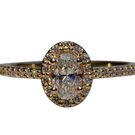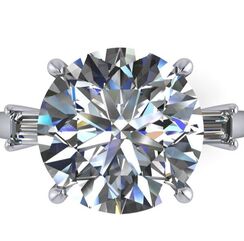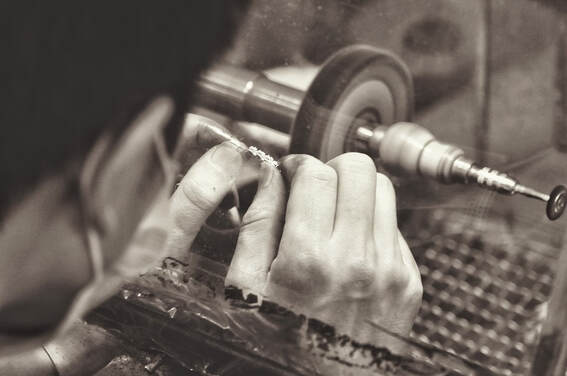Granat Brothers
Granat Brothers began when brothers Joseph and Leo Granat opened their first store in Stockton, California in 1905. Joseph and Leo decided in 1927 to build a retail shop with attached manufacturing workshop at Mission and 20th Streets in Stockton. The flagship store was located at Grant and Geary in San Francisco and opened its doors in 1922. The company expanded quickly and by 1961 there were a total of nine locations growing onward to twenty locations. Then in August of 1961 Zales purchased the retail locations and the manufacturing side was sold to someone else. Before the company sold they established a nationwide distribution of their manufactured designs to over 1000 retailers. Granat Bros. held a trademark on the name Wed-Lok and attempted, unsuccessfully, to patent the process of these interlocking wedding sets in 1950. That being said they did patent many other jewelry related items that were consistently produced well into the 1980's.
The following is a written account about an employee of Granat Brothers, John Quincy Johnson, Jr., who was a Black jewelry. A family member had provided us with the following information about John and his experiences working with Granat Brothers.
The following is a written account about an employee of Granat Brothers, John Quincy Johnson, Jr., who was a Black jewelry. A family member had provided us with the following information about John and his experiences working with Granat Brothers.
|
John Quincy Johnson, Jr. was born February 6, 1910 in Muskogee, Oklahoma to John Quincy Johnson, Sr. and to Mary Elizabeth Webb Johnson. He told me at age 15, he lost his father and he was the oldest child with three younger brothers and sisters, and he had to drop out of high school in order to help his mother take care of his little brothers and sisters.
He got he married in 1932 at the age of 22 years old to Helen Mae Jackson Johnson and they had two children, John Johnson, the third who passed at birth as well as his daughter, Mary Edna Johnson Davidson. John and Helen both worked at a jewelry store, McEntee's jewelers, in Muskogee, OK. My father was the janitor and my mother was a clerk assistant. She wrapped packages and I visited her in the basement of the jewelry store as a little girl when I lived with Mrs. Bryant on 18th St. in Muskogee. The owners of the store, Jess McEntee and his son, apprenticed my father, as a result he was janitor and jewelry repairman for fine jewelry. He became a highly skilled “Bench jeweler.” He knew how to repair jewelry to polish jewelry, and to do other things. It was like an apprenticeship; likely he was not paid a fair wage for his service, because he worked as the janitor and the jeweler but he did all of those things. As a general handyman around the jewelry store, he did many things but as a result of the ability to be trained under Jess McEntee, the owner, they sort of adopted my parents. My parents owned their own home in a mixed middle class area thanks to the McEntee's who gave them the mortgage on their house at 512 N. 7th St. in Muskogee, Oklahoma and paid it off. They were very accommodating when my mother needed to takeoff to work in her family business at the RAGSDALE funeral home. I was named after Jess‘s mother Ellen. When the second world war started, my father decided not to go in to the military, and instead chose to move to Marin county, in California to work in the war industry and my father took a position at Marin Shipyard in Sausalito and moved to Marin City, a small war town that was set up for the families of workers in the war industry about 10 miles directly north of San Francisco next to Sausalito, California. My father was always industrious, so he not only worked in the shipyard building shifts during the day or at night, but when he got off work at the swing shift around midnight. He then went to work as a janitor at Borden's ice cream shop, which was located right in the heart of Sausalito, next to the little city fountain still there on the main street in downtown Sausalito. He worked in the shipyard and at Borden's Ice Cream Fountain as a janitor until the war ended. My mother also worked in the shipyard and the two of them were frugal. They both saved a war bond each payday those $25 and $50 bonds that were good for 10 years, so they would have the opportunity when the war ended to purchase a home and they did that. My father then realized he wanted to get a job in San Francisco working in the jewelry industry so he didn’t call Jess McEntee back in Muskogee. My father said that he was going to a show for jewelry gathering in New York City and that when he was there, he will see someone he knew from San Francisco, a man named Joe Granat of Granat Bros Jewelers and see if they can give him a job. My father, then went to meet with Mr. Granat who offered him a position, invited him to come to work as a Bench Jeweler. Granat Brothers was one of the largest, most prestigious jewelry stores in San Francisco. They had a factory on Mission Street around 25th or 16th and Mission and then they had a larger store downtown near Geary Boulevard and Grant Avenue. I recall my father taking me to both stores which I’ve visited on different occasions. The most important part of this story is that when my father went into work, he was boycotted by some workers, but to get a permanent job he had to become a member of the Union, since Granat Bros was a union shop. The Union president said he would never have a “nigger” in the union and eventually resigned as President. With the support of some of the workers at Granat, John was voted in. There were two or three Italian man who decided to support my father, and they organized and they fought for him to become a member. Finally, my father was admitted to the international brotherhood of jewelry workers. He was the first black man west of the Mississippi to be in the international brotherhood of jewelry workers. He went to work at Granat Bros around 1945 right after the end of World War II, and he stayed there until they closed. He worked as a jeweler until he retired. When he died, he had a pension from the union, and very importantly, over the years he became an officer in the Union. He was elected to be the Sargent at Arms for the San Francisco branch. Below is a photo of my father and a newspaper article from Granat Bros during the time my father worked there. |
